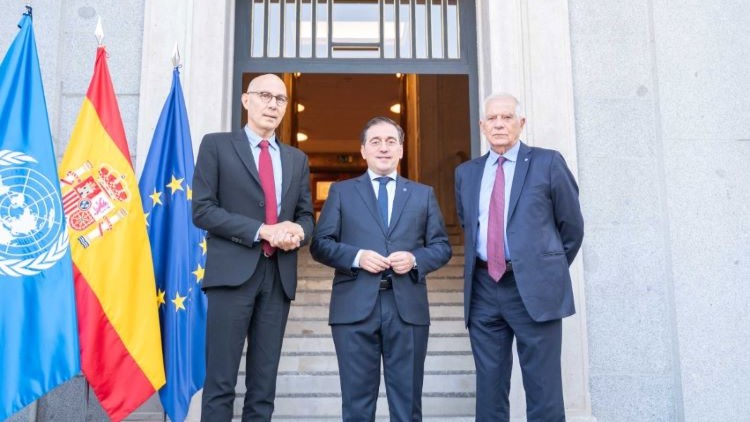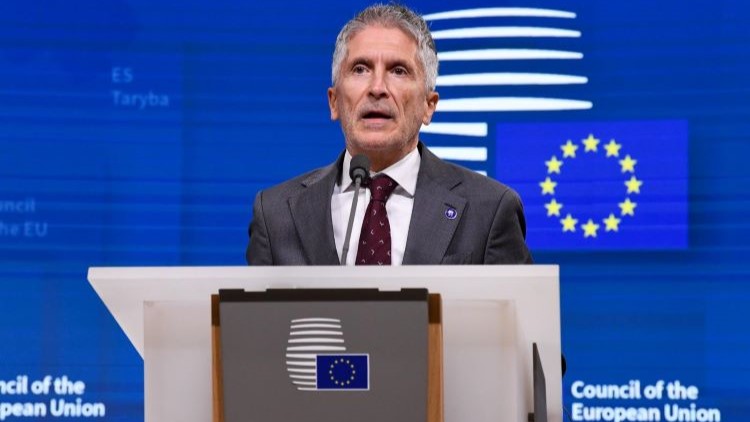Eduardo González
The acting Minister of Foreign Affairs, José Manuel Albares, and the EU High Representative for Foreign Affairs and Security Policy and Vice President of the European Commission, Josep Borrell, inaugurated yesterday in Madrid a commemorative event for the 75th anniversary of the Universal Declaration of Human Rights, in which both defended accountability for war crimes committed during the Russian invasion of Ukraine.
“Spain has at its root the defense and promotion of human and social rights and we firmly believe that only an EU that is a strong defender of human rights inside and outside Europe can truly be a strategic international actor at the height of what all our citizens expect,” said Albares during the High Level Conference, organized by the Spanish Presidency of the Council of the EU and the European External Action Service at the Ministry’s headquarters in Marqués de Salamanca. The UN High Commissioner for Human Rights, Volker Türk, also spoke at the event.
The 1948 Declaration, continued Albares, made it possible, for “the first time”, to have “an international instrument that recognized the equal dignity and rights of all individuals”, as well as “the relationship between peace and respect for human rights”, and, therefore, to establish a “system of protection in accordance with the aspirations of all of us who want a just international community”. However, he warned, “today, the human rights of millions of people, democracy, the values of tolerance and respect that have inspired the Declaration and have also guaranteed decades of peace are under threat in many parts of the world.”
According to Albares, “the Russian aggression against Ukraine is a frontal attack on human rights, the Universal Declaration and the United Nations Charter” and, therefore, “without respect for human rights, a just peace will not be possible”. For this reason, he declared, “Spain supports the International Criminal Court” and supports the creation of “an accountability mechanism to ensure that violations of rights in the war of aggression against Ukraine are investigated, such as the crime against our aid worker Emma Igual, and, above all, that those ultimately responsible are brought to justice.”
“This attack on the UN Charter and the Declaration has come on top of a series of crises that are putting at risk the important advances that we democrats, defenders of multilateralism, defenders of cooperation between States have promoted: climate change, security crises, the terrorist threat, growing food insecurity, the advance of the ultra-right in Europe and other parts of the world, challenge us on how to defend even more strongly democracy and the basic principles of the UN Charter,” he said.
Albares also warned of the “critical situation” in the Sahel countries due to “insecurity, the terrorist threat, democratic regression”, food insecurity and climate emergency, and denounced the “unbearable regression of the rights of women and girls in countries such as Afghanistan or Iran”.
In this context, the acting minister took advantage of the mention to the Tehran regime “to demand, once again, the release by Iran of Santiago Sánchez, unjustly held in that country for more than a year”. Sánchez was detained in early October 2022 when he was on his way on foot to Qatar to attend the World Cup and after visiting the grave of Mahsa Amini, the young Iranian woman who died in police custody after being arrested for wearing the Islamic veil incorrectly.
Josep Borrell
For his part, Josep Borrell warned that “human rights are not something we can take for granted, they are something we have to fight for.” “Despite the achievements made with the Declaration, we still have major problems of inequality, extremism, populism, hate speech, the catastrophic impact of climate change, the frenetic pace at which technology is advancing, 100,000 people who have had to leave their homes in Nagorno-Karabakh” because of the Azeri military incursion, he said.
“The world has to do something, use our political instruments; we have spent 1.5 billion euros to promote human rights and democracy, but we have to do more, much more, especially for the generations to come,” he continued. “There is no solution possible without having the protection of human rights,” he stated. “Young people have to understand this, because maybe they take it for granted, depending on where they live, but they have to have a broader vision of the world, they have to understand that most of humanity still lives without being able to access these rights that for us are universal,” he warned.
“I come from Ukraine,” Borrell recalled, referring to his recent visit to the country and his participation in the Council of Foreign Ministers held this past Monday in the Ukrainian capital. “I have had the opportunity to visit a place near Kyiv where, in two days, 35,000 people were killed, and what impressed me was not that they killed 35. That logistics “is everywhere, it is very powerful”, and it is in the hands of people who “may order this slaughter and then listen to Strauss; they are not barbarians on the fringes of civilization, we are talking about a power that is everywhere and can and does return to Ukraine”, he said.
Apart from that, he denounced, “to block the export of grain, to prevent many people from accessing food, (Russia) has put warships blocking the access of food.” “They are causing millions of people to go hungry: that is a crime against humanity, and we have to be aware of it and denounce it every time we have the opportunity,” he said.
On the other hand, Borrell recalled, “the Declaration has improved accountability and highlighted the principle that no one is so powerful that they can escape justice.” “Is that so? Well, let’s look at it, let’s see if there really is no one powerful enough to escape justice,” Borrell wondered, in an obvious allusion to Russia. “Right now we see that there are many very powerful people who are committing crimes against human rights and whose appearance is being demanded at the International Criminal Court,” he recalled.
On the other hand, Borrell regretted the recourse to “non-interference” as an argument of many governments to avoid international complaints for human rights violations. “It comes up time and time again with the people I have to meet with around the world. ‘Don’t come and tell me how to run my house, my house is my house’: this is the first thing you are told as High Representative when you go to talk about human rights by your counterparts,” he explained. “They tell me: ‘It’s none of your business’. Well, of course it is our business, everywhere, because human rights are not a national matter, States cannot hide behind national sovereignty,” he warned.







